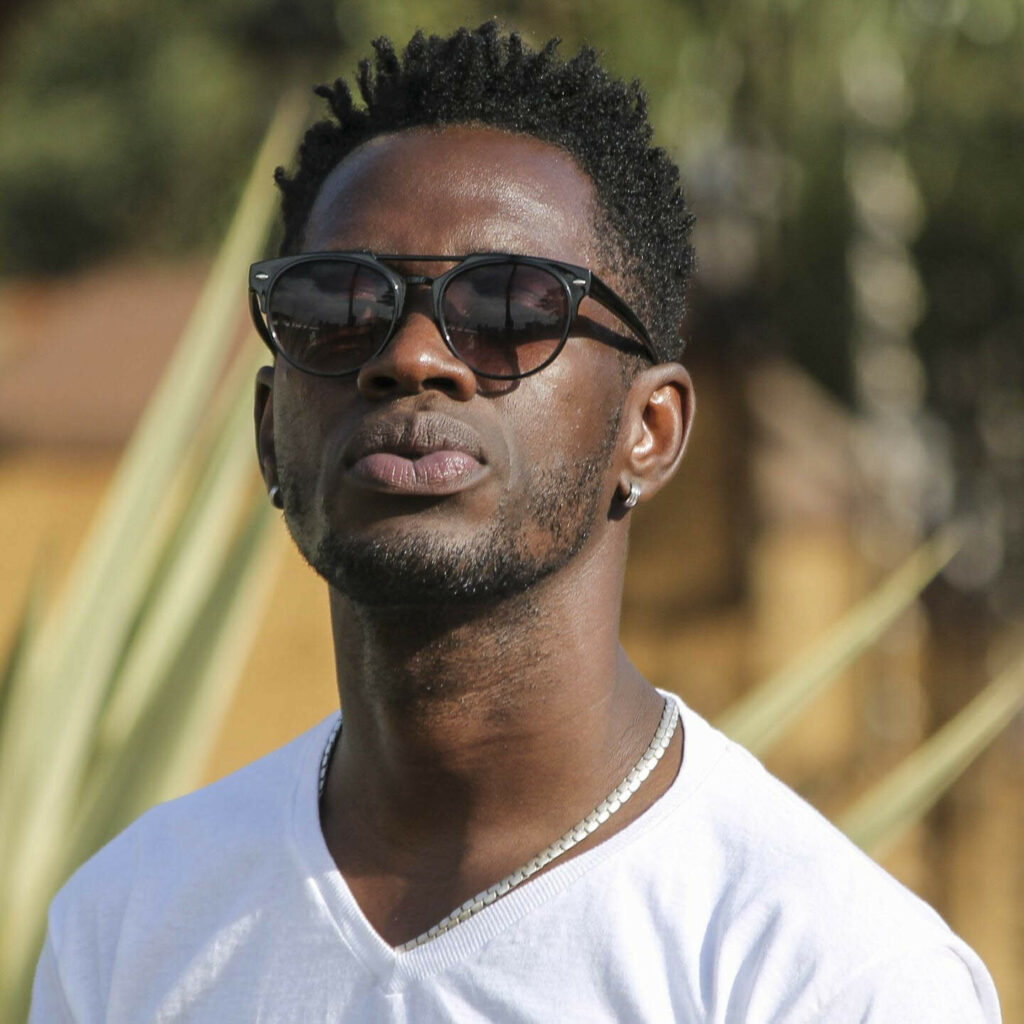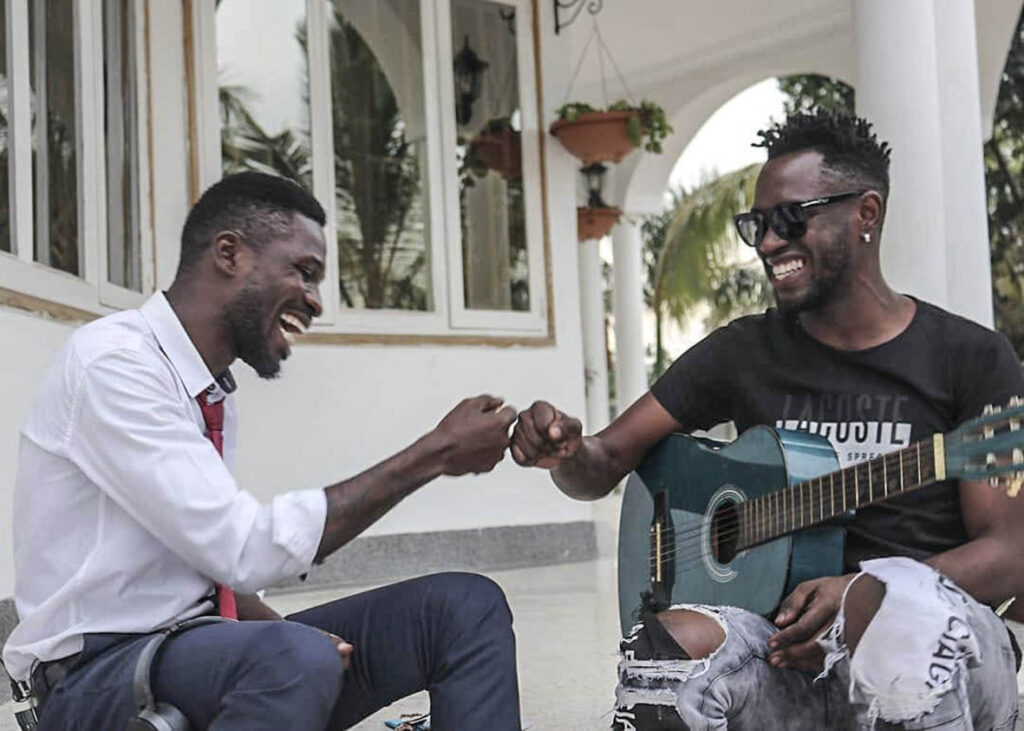Rhythms of resistance: Ali Bukeri, stage name Nubian Li, with Ugandan opposition politician and musician Bobi Wine.
For Ali Bukeni, joining Bobi Wine on the campaign trail was a no-brainer — despite the dangers.
Bukeni, better known by his stage name Nubian Li, is one of Bobi Wine’s musical partners. The pair have recorded a number of songs together. When the 39-year-old singer-turned-politician Bobi Wine — real name Kyagulanyi Ssentamu Robert — sought to end the 35-year tenure of the Ugandan president Yoweri Museveni in January’s elections, Bukeni was by his side.
Bobi Wine’s team was regularly intimidated by the security forces. Arbitrary arrests were not uncommon. Sure enough, at one of their campaign events last December in Kalangala, an island town in central Uganda, security forces apprehended Bukeni and many other members of Wine’s entourage.
“I told them I would comply and that there was no need to use force,” Bukeni told The Continent in an interview. Bukeni said he was held in a truck alongside other campaign staffers and supporters — 127 of them in total were hauled to the police station in Kalangala. Police shot tear gas to disperse the crowd that had gathered to barricade the route to the station.
 Nubian Li
Nubian Li
They were held for three hours at the station before being sent on a ferry to another police station, handcuffed in pairs. “We tried to contest the way they handled us but they told us it was an order from above,” Bukeni said. On reaching land, they were driven to the station where soldiers wielding electric cables and batons awaited their arrival. Everyone was made to frog-jump into the station as they were whipped, hit and pepper sprayed.
Reports of the maltreatment of those arrested during election season abound. Bukeni said he and nine others were transferred to an army encampment where the conditions were hellish.
“We were forced into a very dirty cell. It had no electricity, no bathroom, no blanket. We were provided a bucket and we were all bundled in that one cell, that’s where we spent the night. It was a very cold night,” he said. The ordeal continued the next morning when they had to clean the cell and dispose of the bucket containing their own waste while 30 masked military officers stood guard outside. Their presence “psychologically affected us,” Bukeni said. The soldiers poured water into the cell and ordered the inmates to remove their shirts.
“We were left in a wet room. It would become so cold, we would sit close to one another to keep warm. It was horrible, you would sleep on one side, then turn to another until all sides were hurting and the only option was to sit. Life was really very bad in that cell.”
Police spokesman Fred Enanga told The Continent in a text message that allegations of torture are “unsubstantiated” but urged Bukeni and others arrested to file a formal complaint as it will “help prove or disprove their allegations”.
The torture did not stop there. Pictures, blood samples, statements and swabs of the detainees were taken. At one point during their four-day ordeal, Bukeni’s group and four others were stripped naked at gunpoint. Men claiming to be from human rights groups asked for their phones and addresses, but the guns on their waists suggested they were from the military.
Amid the chaos, there was a glimmer of shared humanity. On New Year’s Day, two days after the arrest, a soldier gave Bukeni and his group a bottle of juice. To show them it wasn’t poisoned, he took a swig of the juice before passing it on. Other soldiers apparently expressed support for the movement and argued they were doing this for the money.
 Nubian Li visits Bobi Wine when he was under house arrest.
Nubian Li visits Bobi Wine when he was under house arrest.
When they were arraigned at the magistrate’s court on 4 January, they were charged with inciting violence and spreading Covid-19 — both bailable offences. The state attorney argued against bail; both judges dismissed his objections. Bukeni and his colleagues thought their ordeal was over. They were wrong.
Instead of being sent home, Bukeni and 48 others were driven to a military barracks in Kampala. Communication with their lawyers was terminated. They were now being tried in military court, accused of being in possession of bullets. They were held at the Kitalya Maximum Prison, notorious for its poor conditions, and they all slept in one cell. Disease outbreaks are common at the prison; medicines are not. Prison officials shaved their heads – Nubian Li suddenly lost his signature look.
Bukeni said he realised their suffering was meant to deal a blow to Bobi Wine. “The real reason we were detained was to isolate Kyagulanyi and the whole election period.”
The hardship lessened as time wore on. Visitors were allowed and Bukeni saw his children for the first time in months. He had to explain to his distraught daughter why he had to wear the yellow prison uniform.
While most prisoners spent the day basking in the sun, Bukeni read. Bobi Wine had brought him some books but they were deemed unacceptable by the prison authorities. These included books by Malcolm X. Bukeni asked for Sowing the Mustard Seed, written by Museveni in 1997; the request was denied. Eventually he was allowed books delivered by his wife. His favourite? Man’s Search for Meaning, Viktor Frankl’s account of his time in a Nazi concentration camp.
In mid-June, Bukeni was finally granted bail. Bukeni says his passion for a better Uganda remains undimmed even after spending six months behind bars. “I am for a system that works for every Ugandan,” he said. He dreams of a free Uganda, where institutions are free and warns Wine never to hold on to power should he ever gain it.
Meanwhile the Museveni train moves on. He won the election in January and is now serving a sixth term, in power until at least 2025. Last week, he named his son, Muhoozi Kainerugaba, as commander of the army’s land forces. All state institutions are in his control.
But Bukeni retains hope that citizen participation remains important. “It starts with us, just like in Sudan, it took citizens to rise up against the system.”
This story first appeared in The Continent, the award-winning pan-African weekly newspaper designed to be read and shared on WhatsApp. To subscribe, send a WhatsApp/Signal message to +27 73 805 6068.